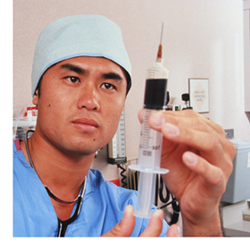State of Connecticut Selects eiTestBed for Meaningful Use Testing
Connecticut’s Department of Health (DPH) has selected PilotFish’s new eiTestBed for Healthcare Integration to support Stage One and Stage Two Meaningful Use testing for all hospitals and practices in the state. The eiTestBed for Healthcare is a self-service, cloud application that provides all of the resources required to establish standardized initial and ongoing healthcare information exchange. It combines a web repository of information and documentation needed to build interfaces to the hosting organization’s system with an automated testing, validation and message simulation facility that enables self-service implementation of those interfaces.
Starting with HL7 immunization messages, the State will configure services for each Meaningful Use reporting requirement. The requirements for these services will be encoded into the eiTestBed’s test facility. As each hospital or practice succeeds in meeting the minimum mandated requirements, the eiTestBed will automatically issue a certificate and create a report as evidence for their attestation. The eiTestBed will also be utilized to support Meaningful Use reporting requirements for lab results and disease reporting.
Utilizing the eiTestBed enables DPH to exceed the basic Meaningful Use requirements of just capturing and verifying the electronic transmission of this data. It makes DPH capable of certifying the conformance of these messages against national standards and internal processing requirements. This capability positions Connecticut to manage future-stage meaningful use testing, and to use the eiTestBed as a pre-production, self-service onboarding tool to greatly reduce the manpower needed to onboard the hundreds of hospitals, clinics and practices in the state.
DPH Replaces Rhapsody Interface Engine with PilotFish Solution to Support HL7 Influenza Reporting to the CDC
The Federal Government, through new initiatives such as the Affordable Care Act and the HITECH Act, has created new reporting requirements for immunization and disease reporting. This has created an added burden on DPH, and other agencies that now need to be able to receive this data from the myriad of practices, medical centers, hospitals and clinics throughout the state. In order to accommodate the hundreds of providers and the variety of formats and communications protocols that their data will be sent in, DPH has turned to PilotFish for a solution.
 PilotFish, in addition to providing a wide spectrum of horizontal integration and data transformation capabilities, has specially tuned the eiPlatform and eiConsole to meet the unique needs of healthcare. Among its capabilities to work with virtually any industry format, PilotFish products include best-of-breed productivity-enhancing features for working with HL7 – the government mandated data standard for the transmission of healthcare information.
PilotFish, in addition to providing a wide spectrum of horizontal integration and data transformation capabilities, has specially tuned the eiPlatform and eiConsole to meet the unique needs of healthcare. Among its capabilities to work with virtually any industry format, PilotFish products include best-of-breed productivity-enhancing features for working with HL7 – the government mandated data standard for the transmission of healthcare information.
Through an offering from the CDC, the DPH was previously given the “Rhapsody” HL7 interface engine and had used this software to develop HL7 interfaces for syndrome surveillance data. After the acquisition of PilotFish, the department conducted an in-depth ROI analysis, electing to replace the HL7-specific Rhapsody engine with PilotFish. After making its recommendation and requesting permission from the CDC to make the change, DPH was given the approval to utilize PilotFish software.
Using PilotFish software, DPH has completed development of a replacement for the HL7 influenza reporting interface. This interface facilitates communication between the State’s laboratory information system (LIS) and the CDC using HL7. PilotFish software is able to accommodate the specific version of HL7 that the CDC requires without any special handling, making this whole process seamless. As an example, the process of reading in the extended version of HL7 that the CDC provides would have taken two weeks using the Rhapsody product. With PilotFish software, it was accomplished in minutes.
DPH is continuing the roll-out with the development of a statewide electronic interface to the immunization registry. This interface will accept HL7 versions 2.3.1 and 2.5 immunization records from hundreds of healthcare providers statewide and will accommodate any communications protocol that the data is sent in.
Both of these initial implementations heavily leverage the data transformation capabilities of the PilotFish product suite, including the Data Mapper. With this tool, DPH is able to graphically map data between various source formats (including CSV, XML and HL7) and various target representations (including Consilience Software’s XML-based Maven Integration Format).
In addition to a significant amount of data transformation, DPH interfaces require the collection of significant audit trail information, the implementation of business-rule driven validation and integration with a number of different types of connectivity, including secure web services and the CDC-approved PHINMS platform.
Key components of this integration include:
- HL7
- XML / Web Services
- Federal Reporting
- Secure Transmission of PHI (Personal Health Information)
- Logging and Audit
- XSLT Data Transformation
Want to learn more and see how PilotFish products can help your agency or department? Click this link to contact the state’s PilotFish Coordinator at DAS/BEST.
Ready to get started now? Download a full license (for state employees) now.
Not a CT department or agency? Call PilotFish at 860 632 9900 for a free consultation and let us show you how you can benefit from this breakthrough technology, too. Or click the link below to email us.

